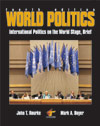Presidents, foreign ministers, and other leaders are not the only ones who affect world politics. They are in the best position to do so, but so can you. As evidence that you can be more than a member of the audience, each of the people here is a private citizen who has made the world a better place. Jody Williams of Putney, Vermont, is the head of the American chapter of the International Campaign to Ban Landmines. For this effort, she and the overall campaign received the Nobel Peace Prize in 1997. President Clinton, who has thus far refused to support the ban, declined to call and congratulate her. "If he calls me, he knows I am going to say, 'What's your problem?'" she explained.1 Muhammad Yunus founded a bank to aid poor people, especially women, in Bangladesh. The Grameen Bank specializes in giving what Yunus calls “micro-credit” for "micro-enterprises" as a poverty-fighting strategy. Since 1976, more than 90 percent of the borrowers have been women; the repayment rate is 90 percent. "Access to credit should be a human right irrespective of economic circumstance," he argues.2 Trick-or-Treaters are kids who care. Since 1950, kids dressed as ghosts, witches, and other Halloween disguises and rattling orange and black milk cartons have raised tens of millions of dollars for the United Nations Children's Fund, popularly known as UNICEF. On Halloween night 1994 alone, these children improved the lives of other children by raising $2.4 million. Rigoberta Menchu , a Guatemalan of Mayan descent, has campaigned for the rights of indigenous people around the world. These efforts brought Menchu the 1992 Nobel Peace Prize. The prize citation, which came on the 500th anniversary year of the arrival of Columbus in the Western Hemisphere, read, "Today, Rigoberta Mench stands out as a vivid symbol of peace and reconciliation across ethnic, cultural, and social dividing lines, in her own country, on the American continent, and in the world."3 Fang Zheng is a Chinese student and athlete, who was a pro-democracy protester at Tiananmen Square in Beijing, China, in 1989. His legs were crushed and later amputated after he was run over by an army tank attacking the demonstrators. A champion-caliber athlete with the discus, Zheng was named to China's national Olympic team for the disabled, then expelled from the team when the government learned of his political convictions. Zheng serves as a model of persistence and a symbol of the gap between human rights rhetoric and practice on the part of many governments. My Lai heroes, three U.S. soldiers (Hugh Thompson, Lawrence Colburn, and Glen Andreotta) were honored in 1998, 30 years after the event, for intervening and stopping the Massacre led by other U.S. troops of innocent villagers in My Lai, South Vietnam. At a ceremony at the Vietnam Memorial in Washington, D.C., the Soldiers Medal, the country's highest award for heroism not involving an enemy, was presented to Thompson, Colburn, and, posthumously, to Andreotta, who died in combat three weeks after he and his comrades engaged in an armed confrontation with their murderous fellow soldiers. Thompson accepted the award on behalf of the vast majority of U.S. soldiers "who served their country with honor on the battlefield in Southeast Asia. This is a very important day for us."4 It certainly was. Notes 1. Interview with Lori Wallach, Foreign Policy, Spring 2000, on the Foreign Policy Web site at: http://www.foreignpolicy.com. 2. New York Times, October 11, 1997, p. A1. 3. Hartford Courant, October 17, 1992, p. A1. 4. New York Times, March 7, 1998, p. A9. |



 2002 McGraw-Hill Higher Education
2002 McGraw-Hill Higher Education